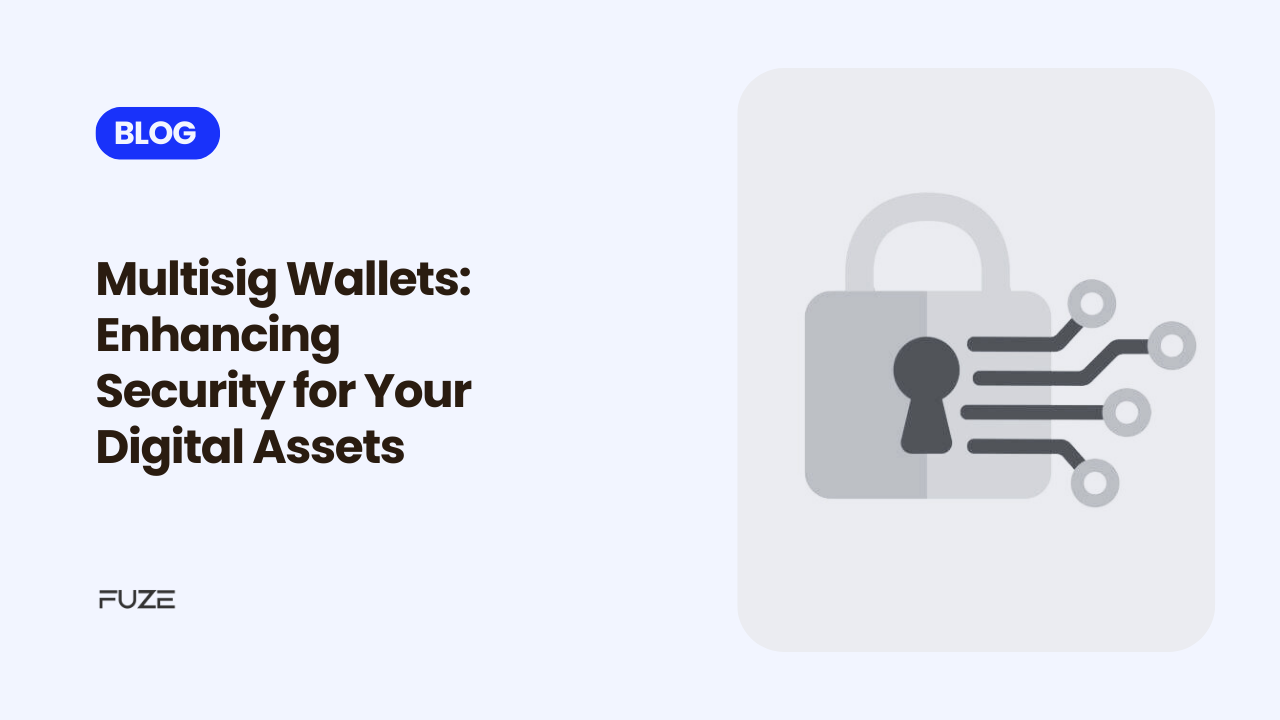In the fast-paced realm of digital assets, protecting your cryptocurrencies has become essential rather than optional. As cyber threats become more sophisticated and malicious actors more resourceful, the risks have never been greater. To tackle this issue, multi-signature (or multisig) wallets have emerged as a revolutionary solution. By requiring multiple approvals for a transaction to go through, these wallets provide a strong defence mechanism that reduces risk, ensures accountability, and strengthens your assets against potential threats.
In this blog, we will understand how multisig wallets function, their advantages and drawbacks, common applications, and best practices to enhance the security of your digital assets.
What Is a Multisig Wallet?
A multisig wallet is a type of cryptocurrency wallet that requires multiple private keys to authorise a transaction. Unlike traditional wallets that rely on a single private key, multisig wallets distribute access across several parties or devices. This arrangement adds an additional layer of security and reduces the risks associated with losing a private key or being targeted by malicious actors.
For instance, a 2-of-3 multisig wallet necessitates two out of three authorised keys to approve a transaction. This design provides flexibility, ensuring that transactions remain secure even if one key is lost or compromised.
How Multisig Wallets Work
The core principle of a multisig wallet is its ability to divide control. Here’s how it functions:
- Setup and Configuration: Users determine the number of keys needed to sign a transaction and the total number of keys created. Common configurations include 2-of-3, 3-of-5, or 5-of-7 schemes.
- Key Distribution: Keys are shared among trusted parties, which may include individuals or organisations.
- Transaction Initiation: When a transaction is initiated, it must be signed by the minimum number of keys specified in the wallet’s setup.
- Validation and Execution: After the required signatures are collected, the transaction is validated and broadcasted on the blockchain.
By necessitating multiple keys, multisig wallets significantly lower the chances of unauthorised access or loss due to a single compromised key.
Benefits of Multisig Wallets
Multisig wallets offer a host of advantages, making them a trusted choice for individuals and organisations managing substantial digital assets:
- Enhanced Security
The standout benefit of a multisig wallet is its heightened security. Even if a malicious actor gains access to one private key, they cannot authorise a transaction without the other signing keys. This significantly reduces the risk of unauthorised access and protects funds from single-point vulnerabilities. - Reduced Risk of Human Error
Losing a private key often results in permanent loss of funds. Multisig wallets mitigate this risk by distributing control across multiple keys. For instance, if one key is misplaced, the remaining keys can still grant access to your assets, ensuring greater resilience. - Collaborative Decision-Making
Ideal for organisations or partnerships, multisig wallets enable shared control by distributing keys among stakeholders. Transactions require consensus, fostering transparency and accountability while eliminating the risks of unilateral actions. - Flexible Recovery Options
Certain multisig configurations incorporate redundancy, allowing funds to remain accessible even if one key is permanently lost. This feature is particularly valuable for those managing large crypto holdings, providing peace of mind and ensuring funds are not irretrievably locked.
Use Cases for Multisig Wallets
Multisig wallets serve a variety of purposes for different types of users, ranging from individuals to large businesses:
- Personal Security: For individual users, multisig wallets add an extra layer of security against loss and theft. By keeping keys on separate devices or giving them to a trusted third party, users can protect their funds more efficiently.
- Corporate Treasury Management: Businesses frequently utilise multisig wallets to oversee corporate finances. By requiring multiple approvals for transactions, companies can implement checks and balances to help prevent internal fraud.
- Decentralised Organisations: Decentralised Autonomous Organisations (DAOs) and other blockchain-based groups often rely on multisig wallets for governance. This ensures that funds are only moved with majority consent, which aligns with the principles of decentralisation.
- Escrow Services: In situations that involve escrow, such as real estate transactions or freelance agreements, a multisig wallet can be set up to include the buyer, seller, and an escrow agent. This guarantees that funds are only released when all parties agree to the conditions.
Limitations of Multisig Wallets
While multisig wallets provide several advantages, they also come with their own set of challenges:
- Complex Setup: Establishing a multisig wallet demands a certain level of technical expertise that might discourage users who are not very tech-savvy. Ensuring proper configuration is essential to prevent accessibility problems.
- Dependency on Multiple Parties: Relying on several key holders can cause delays in executing transactions, particularly if one of the key holders is unavailable or unwilling to cooperate.
- Recovery Challenges: If too many keys are lost or become inaccessible, the funds could be permanently locked away. Users need to have contingency plans in place to avoid this situation.
- Limited Support: Not every cryptocurrency or wallet provider offers multisig functionality, which could restrict its use for some individuals.
Choosing the Right Multisig Wallet
When picking a multisig wallet, keep these factors in mind:
- Reputation: Opt for a wallet provider known for its reliability and robust security measures.
- Ease of Use: Seek out wallets with intuitive interfaces and thorough support documentation to make setup and management easier.
- Compatibility: Confirm that the wallet can handle the cryptocurrencies you plan to use.
- Backup and Recovery Options: Assess the wallet’s recovery features and backup solutions to protect against losing your keys.
Some well-known multisig wallet providers are Rabby Wallet, Electrum, and Gnosis Safe, each designed to meet various user requirements.
Conclusion
In a time when digital assets hold substantial value, their security is paramount. As the cryptocurrency landscape evolves, multisig wallets are set to become increasingly essential for managing digital assets. Advances in wallet technology, including threshold signatures and smart contract solutions, are expected to improve both functionality and user experience. Additionally, with growing regulatory oversight, multisig wallets could be crucial in helping institutional investors and corporations meet security compliance standards.
Disclaimer: Virtual assets carry significant risks, including high volatility and potential loss of your entire investment. They are not backed by governmental protections, and recourse may be limited in case of loss. Always assess your risk tolerance, fully understand the risks, and seek independent financial advice if needed before investing.
Frequently Asked Questions
- Can I recover funds if I lose one of my keys?
Yes, as long as the remaining required keys are intact. For instance, in a 2-of-3 setup, you can still access funds with any two keys even if one is lost. It’s crucial to plan for key redundancy when configuring your wallet. - Who can hold the keys in a multisig wallet?
Keys can be held by the wallet owner on separate devices, distributed among trusted individuals, or stored with third parties like custodians or security services to ensure diversified control. - Are multisig wallets suitable for everyday transactions?
While multisig wallets enhance security, they may not be practical for frequent transactions due to the added steps required for multiple approvals. They are better suited for long-term storage or high-value transactions. - What happens if one key holder refuses to cooperate?
The wallet’s configuration determines what happens. For example, in a 2-of-3 setup, two cooperating key holders can still authorize a transaction, even if the third party refuses to participate. - Are multisig wallets compatible with all cryptocurrencies?
Not all cryptocurrencies or wallet providers support multisig functionality. Bitcoin and Ethereum, among others, have robust multisig wallet options, but support varies for smaller or less popular tokens.







